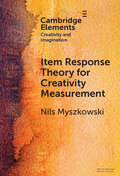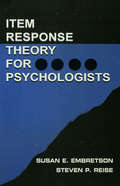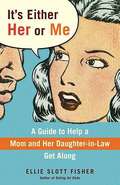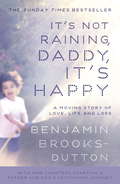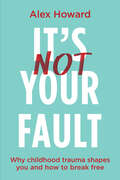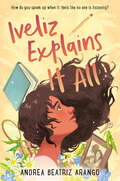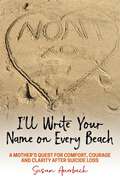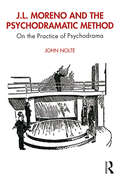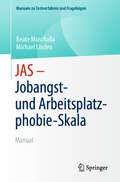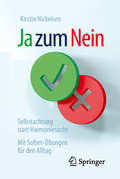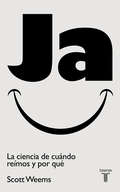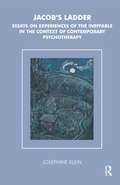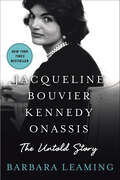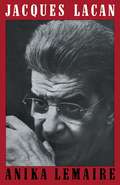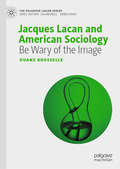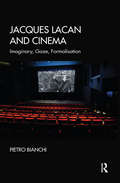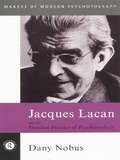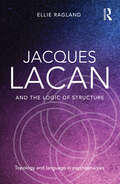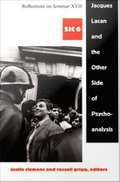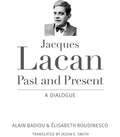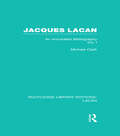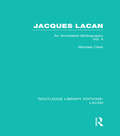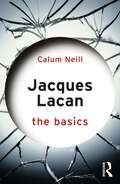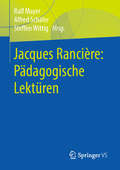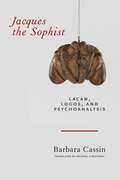- Table View
- List View
Item Response Theory for Creativity Measurement (Elements in Creativity and Imagination)
by Nils MyszkowskiItem-response theory (IRT) represents a key advance in measurement theory. Yet, it is largely absent from curricula, textbooks and popular statistical software, and often introduced through a subset of models. This Element, intended for creativity and innovation researchers, researchers-in-training, and anyone interested in how individual creativity might be measured, aims to provide 1) an overview of classical test theory (CTT) and its shortcomings in creativity measurement situations (e.g., fluency scores, consensual assessment technique, etc.); 2) an introduction to IRT and its core concepts, using a broad view of IRT that notably sees CTT models as particular cases of IRT; 3) a practical strategic approach to IRT modeling; 4) example applications of this strategy from creativity research and the associated advantages; and 5) ideas for future work that could advance how IRT could better benefit creativity research, as well as connections with other popular frameworks.
Item Response Theory: Item Response Theory For Psychologists (Multivariate Applications Series)
by Steven P. Reise Susan E. EmbretsonThis book develops an intuitive understanding of IRT principles through the use of graphical displays and analogies to familiar psychological principles. It surveys contemporary IRT models, estimation methods, and computer programs. Polytomous IRT models are given central coverage since many psychological tests use rating scales. Ideal for clinical, industrial, counseling, educational, and behavioral medicine professionals and students familiar with classical testing principles, exposure to material covered in first-year graduate statistics courses is helpful. All symbols and equations are thoroughly explained verbally and graphically.
It’s Either Her or Me: A Guide to Help a Mom and Her Daughter-in-Law Get Along
by Ellie Slott FisherFrom the author of "Dating for Dads" and "Mom, There's a Man in the Kitchen and He's Wearing Your Robe" comes a new advice book covering the stickiest of relationships--that between a mother and her son's significant other.
It’s Not Raining, Daddy, It's Happy
by Benjamin Brooks-DuttonThe Sunday Times bestsellerThe moving and inspiring account of heartbreak and courage, and the life-affirming relationship between a father and son. Ben Brooks-Dutton's wife - the great love of his life - was knocked down and killed by a car as he walked beside her, pushing their two-year-old son in his buggy. Life changed forever. Suddenly Ben was a widower deep in shock, left to raise their bewildered child alone. In the aftermath Ben searched for guidance from men in similar situations, but it appeared that young widowed fathers don't talk. Well meaning loved ones admired his strength. The unwritten rule seemed to be to 'shut up, man up and hide your pain'. Lost, broken and afraid of the future, two months after his wife Desreen's death, Ben started a blog with the aim of rejecting outdated conventions of grief and instead opening up about his experiences. Within months Life as a Widower, had received a million hits and had started an all-too-often hushed conversation about the reality of loss and grief. This is the story of a man and a child who lost the woman they so dearly love and what happened in the year that followed. Ben describes the conflicting emotions that come from facing grief head on. He rages against the clichés used around loss and shows the strange and cruel ways in which grief can take hold. He also charts what it means to become a sole parent to a child who has lost their mother and cannot yet understand the meaning of death. Through the shock and sadness shine moments of hope and insight. So much of what Ben learns comes from watching his son struggle, survive and live, as children do, from moment to moment where hurt can turn to happiness and anger can turn to joy. This is a story of loss, heartbreak and courage. At its heart is the funny, infuriating and life affirming relationship between a father and son and their ongoing love for an extraordinary woman.
It’s Not Your Fault: Why Childhood Trauma Shapes You and How to Break Free
by Alex HowardThis powerful self-help book will change the way you see your past and transform the way you live now.Do you struggle to find happiness in yourself or in your relationships? Do you have issues with your physical or mental health such as fatigue, anxiety, sleep problems, addictions or depression? Do you feel emotionally numb, or are you unable to truly feel your emotions? You are not alone. And maybe you need to stop blaming yourself.We are all affected by our early experiences – both good and bad. But for many of us, the patterns of our younger years have damaged us as adults, leaving us unable to truly feel or form lasting positive relationships with ourselves and others.As children, we're dependent on those around us to meet our emotional needs for us – the need for boundaries, safety and love. When these key needs go unanswered, the template for good mental health in adulthood is not properly formed. As adults, we can learn to meet these needs for ourselves, and to break free from a life of unnecessary suffering. Doing so doesn't just heal the impact of our past, it also helps us unlock our true potential in life.Childhood trauma will continue to trap us throughout our lives if we don't seek to confront it. Drawing on his own healing from childhood trauma and his clinical work with thousands of patients, Alex Howard sets a clear path to understanding your own unique blueprint from childhood and then provides a clinically proven reset plan for healing.It's Not Your Fault will help you to understand your trauma and heal its impact, build better boundaries and connect to your emotions to create healthy and fulfilling relationships.
Iveliz Explains It All: (Newbery Honor Award Winner)
by Andrea Beatriz ArangoHow do you speak up when it feels like no one is listening? In this moving novel in verse that Printz Honor-winning author Lisa Fipps calls "powerful," one girl takes on seventh grade while facing mental health challenges, and must find her voice to advocate for the help and understanding she deserves.Listen up:The end of elementary school?Worst time of my life.And the start of middle school?I just wasn&’t quite right.But this year?YO VOY A MI.Seventh grade is going to be Iveliz&’s year. She&’s going to make a new friend, help her abuela Mimi get settled after moving from Puerto Rico, and she is not going to get into any more trouble at school. . . .Except is that what happens? Of course not. Because no matter how hard Iveliz tries, sometimes people say things that just make her so mad. And worse, Mimi keeps saying Iveliz&’s medicine is unnecessary—even though it helps Iveliz feel less sad. But how do you explain your feelings to others when you&’re not even sure what&’s going on yourself?Powerful and compassionate, Andrea Beatriz Arango&’s debut navigates mental health, finding your voice, and discovering that those who really love you will stay by your side.
I’ll Write Your Name on Every Beach: A Mother’s Quest for Comfort, Courage and Clarity After Suicide Loss
by Susan AuerbachWritten by a mother who lost her 21 year old son to suicide, this book deals with the themes of suicide loss through the lens of the author's personal grief. Addressing the process of post-traumatic growth, this memoir provides the bereaved with therapy exercises and creative activities to help them come to terms with their loss. Although it deals directly with losing a child, much of the book pertains to grief generally, especially complicated grief after a sudden death, and thus provides comfort to any reader who has lost a close one to suicide or anyone interested in young people struggling with mental health. Organised thematically, it addresses the many issues and stages involved in the grieving process and ends each chapter with a variety of beneficial yoga, breathing and therapy activities. This allows readers to dip in and out of the book, and go at their own pace - replicating the fact that grief is not a linear journey but an iterative one that goes back and forth. This book is a lifeline for anyone struggling to process loss.
J.L. Moreno and the Psychodramatic Method: On the Practice of Psychodrama
by John NolteBeginning with a discussion of the intrinsic nature of psychodrama and providing the reader with a thorough description of the psychodramatic method, this book navigates the nature, applications, theories, and practices of the techniques originated by J. L. Moreno. The book covers the work of the psychodrama pioneer in the field of mental health and discourse on his techniques. Methods of handling situations and scenarios that frequently arise in psychodrama sessions are described and amply illustrated with examples from actual psychodramas. The existential philosophy upon which psychodrama is founded, Moreno’s Doctrine of Spontaneity-Creativity, and the theories important to understanding psychodrama are all discussed. The final chapter is devoted to the life and work of J. L. Moreno. This book will be of great interest to psychodramatists, drama therapists, psychotherapists, and other mental health professionals who use the psychodramatic method in counseling and training programs.
JAS - Jobangst- und Arbeitsplatzphobie-Skala: Manual (Manuale zu Testverfahren und Fragebögen)
by Michael Linden Beate MuschallaDie Job-Angst-Skala (JAS) ist ein phänomenologie-basierter Selbstbeurteilungsfragebogen zur Erfassung der verschiedenen Dimensionen arbeitsbezogener Ängste. Die Skala besteht aus 70 Items, die in fünf Hauptdimensionen zusammengefasst werden können: Stimulusbezogene Ängste und Vermeidungsverhalten; Soziale Ängste und Beeinträchtigungskognitionen; Gesundheits- und körperbezogene Ängste; Insuffizienzerleben; Arbeitsbezogene generalisierte Sorgen.
Ja zum Nein: Selbstachtung Statt Harmoniesucht - Mit Sofort-übungen Für Den Beruflichen Alltag
by Kirstin NickelsenDieses Buch ist ein echter Selbstschutz-Leitfaden für alle, denen Grenzen setzen schwer fällt. Ihnen kommt ein „Nein“ zu Mehrarbeit oder Gefälligkeiten nur schwer über die Lippen, obwohl der eigene Schreibtisch schon randvoll ist. Stattdessen bleibt der hilflose Ärger über Chefs und Kollegen: „Immer ich, mit mir kann man es ja machen!“. Privat läuft es ähnlich, doch irgendwann ist das Maß voll, sind die Batterien leer. Davor schützt nur gekonntes „Nein“-Sagen – und das will gelernt sein. Wer nicht gut „Nein“ sagen kann, hat in der Regel Angst: vor dem Verlust des Jobs, vor dem Verlust von Zuneigung, Wertschätzung etc. Die Autorin hinterfragt diese Ängste und zeigt Wege, sie einfach und souverän zu bewältigen, eigene Grenzen zu erkennen und diese voll Selbstrespekt zu wahren. So gewinnt sich der Leser wieder als wichtigsten Menschen im eigenen Leben. Zahlreiche praktische Übungen, die sofort in die Tat umgesetzt werden können, machen dieses Buch zu einem besonders wertvollen Alltagshelfer. Die dritte Auflage wurde sorgfältig durchgesehen.
Ja: La ciencia de cuándo reímos y por qué
by Scott WeemsJa. La ciencia de cuando reímos y por qué Un libro que se toma en serio el tema del humor Lo reconocemos nada más verlo, pero es difícil definir el humor. En esta fascinante investigación, Scott Weems analiza, desde un punto de vista neurológico, pero también psicológico, antropológico y cultural, los mecanismos y resortes de la risa, así como sus beneficios probados. Tratar de explicar una broma es un despropósito, pero eso no ha impedido a los pensadores, de Aristóteles a Bergson, pasando por Kant y Nietzsche, construir amplias y sutiles teorías de la risa. Sin embargo, ninguno de ellos contaba con la información que aporta un escáner. ¿Sabías que el sentido del humor está estrechamente relacionado con la inteligencia o con la capacidad para resolver problemas? ¿Y que también depende de la edad, del sexo, de la nacionalidad o del nivel de dopamina? El humor surge de un conflicto interno en el cerebro, y forma parte de nuestro proceso de comprensión de este mundo complejo. Desde el papel del humor negro hasta el beneficio de la risa para nuestro sistema inmunológico, Ja levanta el telón sobre la más humana de las cualidades. Del mismo modo que los ordenadores no son capaces de apreciar la ironía, ningún libro de autoayuda conseguirá convertirnos en personas graciosas. Ja, basado en las últimas investigaciones e ilustrado con reveladoras anécdotas -e incluso algunos chistes-, revela, no obstante, numerosas claves para incorporar el humor a nuestras vidas La crítica ha dicho...«La risa quema calorías, baja la glucosa en los diabéticos y mejora el sistema inmunológico. Este libro es una respuesta a enigmas e incongruencias que los utopistas resuelven en abstracciones dogmáticas y que la risa revela como locura.»ABC (Cultural) «Weems maneja una impresionante cantidad de estudios y estadísticas para apoyar sus tesis. Muestra que procesamos chistes de un modo casi idéntico a la forma en que abordamos los problemas, y que, en caso de éxito, generamos un torrente de dopamina. Una convincente defensa del lado cómico de la vida.»Financial Times «Scott Weems muestra en qué lugar de nuestra cabeza reside la gracia.»Washington Post «La obra de Scott Weems es un compendio excelente de las últimas teorías acerca del humor en el cerebro que explica de forma amena y entretenida los recientes avances de la neurociencia en este campo.»La Razón «El humor es como el ejercicio del cerebro, dice Weems: tal vez no alargue la vida, pero la hace más saludable; o al menos, más divertida.»Diario de Navarra «Basándose tanto en las más recientes investigaciones neurocientíficas como en divertidas anécdotas, el autor huye del reduccionismo y defiende la idea de que el humor es más complejo que otras emociones y percepciones.»The Scientist «Un estimulante repaso de los descubrimientos que se han hecho sobre por qué reímos.»Kirkus Reviews «Según Weems el humor nos ayuda a establecer un poco de orden en un mundo desordenado. Ja revela los mecanismos internos del humor con todo el brío que requiere la materia.»Psychology Today «Weems hace una buena defensa de cómo el humor saca lo mejor de nosotros, y de la necesidad de reír más.»The New York Times «La risa sigue siendo una especie de enigma, pero vale la pena adentrarse en ella. Una alegre mirada hacia lo que es, para qué sirve y por qué debemos cultivarla.»Nature
Jacob's Ladder: Essays on Experiences of the Ineffable in the Context of Contemporary Psychotherapy
by Josephine KleinThis book considers mysticism – a world of ineffable experience – to see if it might have anything to teach those in the therapeutic world, invites the reader to look at newer ways of psychoanalytic thinking, and uses writers of the past to help illuminate contemporary issues.
Jacqueline Bouvier Kennedy Onassis: The Untold Story
by Barbara LeamingThe instant New York Times and USA Today bestseller!The untold story of how one woman's life was changed forever in a matter of seconds by a horrific trauma.Barbara Leaming's extraordinary and deeply sensitive biography is the first book to document Jacqueline Kennedy Onassis' brutal, lonely and valiant thirty-one year struggle with post-traumatic stress disorder (PTSD) that followed JFK's assassination.Here is the woman as she has never been seen before. In heartrending detail, we witness a struggle that unfolded at times before our own eyes, but which we failed to understand.Leaming's biography also makes clear the pattern of Jackie's life as a whole. We see how a spirited young woman's rejection of a predictable life led her to John F. Kennedy and the White House, how she sought to reconcile the conflicts of her marriage and the role she was to play, and how the trauma of her husband's murder which left her soaked in his blood and brains led her to seek a very different kind of life from the one she'd previously sought.A life story that has been scrutinized countless times, seen here for the first time as the serious and important story that it is. A story for our times at a moment when we as a nation need more than ever to understand the impact of trauma.
Jacques Lacan
by Anika LemaireThe work of Jaques Lacan, eminent French psychoanalyst and influential thinker (1901-1981), is recognized as being of vital importance to psychoanalysts, philosophers, and all those concerned with the the study of man and language. Its value is not limited to the field of psychoanalysis alone, but provides the basis for a new philosophy of man and a new theory of discourse. It is, however, notoriously difficult for the non-specialist reader to come to terms with Lacan's reading of Freud and his investigations of the unconscious. Until now, there has been no satisfactory general introduction to Lacan, and this first general exposition of his work, translated and revised from the French edition, is designed to provide the conceptual tools which will enable the reader to study Lacan using the original texts.
Jacques Lacan and American Sociology: Be Wary of the Image (The Palgrave Lacan Series)
by Duane RousselleIn this Palgrave Pivot, Duane Rousselle aims to disrupt the hold that pragmatist ideology has had over American sociology by demonstrating that the social bond has always been founded upon a fundamental and primordial bankruptcy. Using the Lacanian theory of “capitalist discourse,” Rousselle demonstrates that most of early American sociology suffered from an inadequate account of the “symbolic” within the mental and social lives of the individual subject. The psychoanalytic aspect of the social bond remained theoretically undeveloped in the American context. Instead it is the “image,” a product of the imaginary, which takes charge over any symbolic function. This intervention into pragmatic sociology seeks to recover the tradition of “grand theory” by bringing psychoanalytical and sociological discourse into fruitful communication with one another.
Jacques Lacan and Cinema: Imaginary, Gaze, Formalisation
by Pietro BianchiPsychoanalysis has always been based on the eclipse of the visual and on the primacy of speech. The work of Jacques Lacan though, is strangely full of references to the visual field, from the intervention on the mirror stage in the Forties to the elaboration of the object-gaze in the Sixties. As a consequence, a long tradition of film studies used Lacanian psychoanalysis in order to explain the influence of the subject of the unconscious on the cinematographic experience. What is less known is how the late Lacanian reflection on the topic of analytic formalization opened up a further dimension of the visual that goes beyond the subjective experience of vision: not in the direction of a mystical ineffable but rather toward a subtractive mathematisation of space, as in non-Euclidean geometries. In an exhaustive overview of the whole Lacanian theorization of the visual, counterpointed by a confrontation with several thinkers of cinema (Eisenstein, Straub-Huillet, Deleuze, Ranciere), the book will lead the reader toward the discovery of the most counterintuitive approaches of Lacanian psychoanalysis to the topic of vision.
Jacques Lacan and the Freudian Practice of Psychoanalysis (Makers of Modern Psychotherapy)
by Dany NobusJacques Lacan and the Freudian Practice of Psychoanalysis paints a completely new picture of the man and his ideas. The book suceeds in showing how ideas can become more accessible, and re-evaluates his significance within the field of psychodynamic psychotherapy.The book is structured thematically around five key issues: diagnosis, the analyst's position during the treatment, the management of transference, the formulation of interpretations, and the organisation of analytic training. For each of these issues, Lacan's entire work both published and unpublished material, has been taken into account and theoretical principles have been illustrated with clinical examples. The book also contains the first complete bibliography of Lacan's works in English.Clear, detailed, and wide ranging, Jacques Lacan and the Freudian Practice of Psychoanalysis will prove essential reading, not only for professionals and students within the fields of psychology and psychiatry, but for all those keen to discover a new Lacan.
Jacques Lacan and the Logic of Structure: Topology and language in psychoanalysis
by Ellie RaglandLacan postulated that the psyche can be understood by means of certain structures, which control our lives and our desires, and which operate differently at different logical moments or stages of formation. Jacques Lacan and the Logic of Structure offers us a reading of the major concepts of Lacan in terms of his later topological theory and aims to show how this was always a concern for Lacan and not only an issue in the last seminars. Ellie Ragland discusses how various stages of formation can be uncovered topologically within language itself, and operate to place certain properties – fantasy, the drive, jouissance, discourse and ethics in language itself. In this way she explores not only how language actually works in tandem with the properties, but also gives a different idea of what knowledge actually is and what implications that may have for reimagining and reworking differential/diagnostic structures. Jacques Lacan and the Logic of Structure is a compelling exponent of the innovative approaches Lacan takes to rethinking what psychoanalysis is and what it can do to enlighten psychoanalysts and treat patients. It will be essential reading to psychoanalysts, psychoanalytic psychotherapists training graduate students in the fields of film, literary, gender and cultural studies.
Jacques Lacan and the Other Side of Psychoanalysis: Reflections on Seminar XVII sic 6
by Justin Clemens Russell GriggThis collection is the first extended interrogation in any language of Jacques Lacan's Seminar XVII. Originally delivered just after the Paris uprisings of May 1968, Seminar XVII marked a turning point in Lacan's thought; it was both a step forward in the psychoanalytic debates and an important contribution to social and political issues. Collecting important analyses by many of the major Lacanian theorists and practitioners, this anthology is at once an introduction, critique, and extension of Lacan's influential ideas. The contributors examine Lacan's theory of the four discourses, his critique of the Oedipus complex and the superego, the role of primal affects in political life, and his prophetic grasp of twenty-first-century developments. They take up these issues in detail, illuminating the Lacanian concepts with in-depth discussions of shame and guilt, literature and intimacy, femininity, perversion, authority and revolt, and the discourse of marketing and political rhetoric. Topics of more specific psychoanalytic interest include the role of objet a, philosophy and psychoanalysis, the status of knowledge, and the relation between psychoanalytic practices and the modern university. Contributors. Geoff Boucher, Marie-Hlne Brousse, Justin Clemens, Mladen Dolar, Oliver Feltham, Russell Grigg, Pierre-Gilles Guguen, Dominique Hecq, Dominiek Hoens, ric Laurent, Juliet Flower MacCannell, Jacques-Alain Miller, Ellie Ragland, Matthew Sharpe, Paul Verhaeghe, Slavoj Žižek, Alenka Zupancic
Jacques Lacan, Past and Present: A Dialogue
by Alain Badiou Elisabeth RoudinescoIn this dialogue, Alain Badiou shares the clearest, most detailed account to date of his profound indebtedness to Lacanian psychoanalysis. He explains in depth the tools Lacan gave him to navigate the extremes of his other two philosophical "masters," Jean-Paul Sartre and Louis Althusser. Élisabeth Roudinesco supplements Badiou's experience with her own perspective on the troubled landscape of the French analytic world since Lacan's death—critiquing, for example, the link (or lack thereof) between politics and psychoanalysis in Lacan's work. Their exchange reinvigorates how the the work of a pivotal twentieth-century thinker is perceived.
Jacques Lacan: An Annotated Bibliography (Routledge Library Editions: Lacan)
by Michael P. ClarkThis bibliography in two volumes, originally published in 1988, lists and describes works by and about Jacques Lacan published in French, English, and seven other languages including Japanese and Russian. It incorporates and corrects where necessary all information from earlier published bibliographies of Lacan’s work. Also included as background works are books and essays that discuss Lacan in the course of a more general study, as well as all relevant items in various bibliographic sources from many fields.
Jacques Lacan: An Annotated Bibliography (Routledge Library Editions: Lacan)
by Michael P. ClarkThis bibliography in two volumes, originally published in 1988, lists and describes works by and about Jacques Lacan published in French, English, and seven other languages including Japanese and Russian. It incorporates and corrects where necessary all information from earlier published bibliographies of Lacan’s work. Also included as background works are books and essays that discuss Lacan in the course of a more general study, as well as all relevant items in various bibliographic sources from many fields.
Jacques Lacan: The Basics (The Basics)
by Calum NeillJacques Lacan: The Basics provides a clear and succinct introduction to the work of Jacques Lacan, one of the key thinkers of the twentieth century. Lacan’s ideas are applied in the study of the humanities, politics, and psychology as well as contemporary media and the arts, but their complexity makes them impenetrable to many. This book is unique in explaining the key concepts and context, from Lacan’s understanding of psychoanalysis to drive and desire, in an accessible way without diluting them beyond meaning. Examples from popular culture are used throughout to emphasise the ideas being discussed and a full glossary and list of resources for further reading encourages additional exploration. This engaging and accessible text is essential reading for all those interested in Lacan and his work, as well as students of psychology, psychoanalysis, literature, politics, cultural studies, film studies, and more.
Jacques Rancière: Pädagogische Lektüren
by Ralf Mayer Alfred Schäfer Steffen WittigEs sind die zugleich politischen und ästhetischen Einsatzpunkte Jacques Rancières, die das pädagogische Nachdenken herausfordern: Angesprochen sind damit etwa die Intervention in ein- wie ausschließende ‚Ordnungen des Sinnlichen‘, die Artikulation eines ‚Unvernehmens‘ über die Unterstellung von je spezifischen Gleichheitsmotiven und das Plädoyer für ein ästhetisches Regime, das in unterschiedlichen Feldern definitive und privilegierte Sichtweisen irritiert. Diese Herausforderungen gelten nicht nur für Begründungen und Qualifizierungen von Praktiken und Institutionen; ebenso erscheinen pädagogische Problemstellungen stets disziplinübergreifend in Spannungsfeldern von Politik und (polizeilicher) Ordnung situiert.
Jacques the Sophist: Lacan, Logos, and Psychoanalysis
by Barbara CassinSophistry, since Plato and Aristotle, has been philosophy’s negative alter ego, its bad other. Yet sophistry’s emphasis on words and performativity over the fetishization of truth makes it an essential part of our world’s cultural, political, and philosophical repertoire. In this dazzling book, Barbara Cassin, who has done more than anyone to reclaim a mode of thought that traditional philosophy disavows, shows how the sophistical tradition has survived in the work of psychoanalysis.In a highly original rereading of the writings and seminars of Jacques Lacan, together with works of Freud and others, Cassin shows how psychoanalysis, like the sophists, challenges the very foundations of scientific rationality. In taking seriously equivocations, jokes, and unfinishable projects of interpretation, the analyst, like the sophist, allows performance, signifier, and inconsistency to reshape truth.This witty, brilliant tour de force celebrates how psychoanalysts have become our culture’s key dissidents and register, in Lacan’s words, “the presence of the sophist in our time.”
